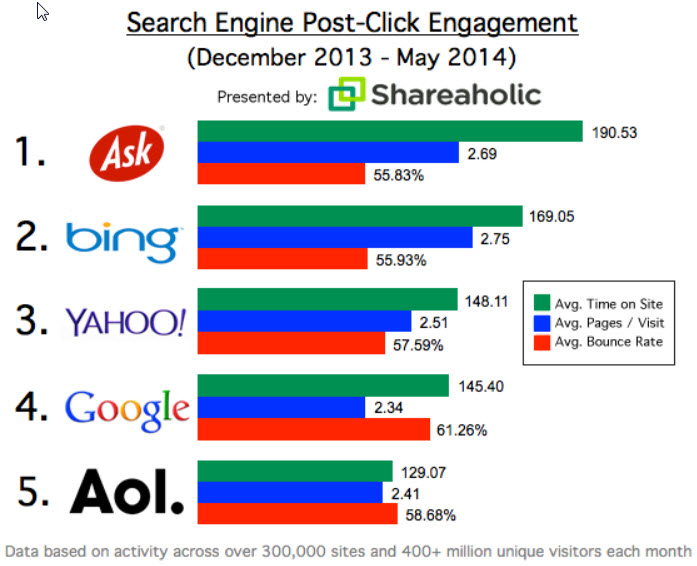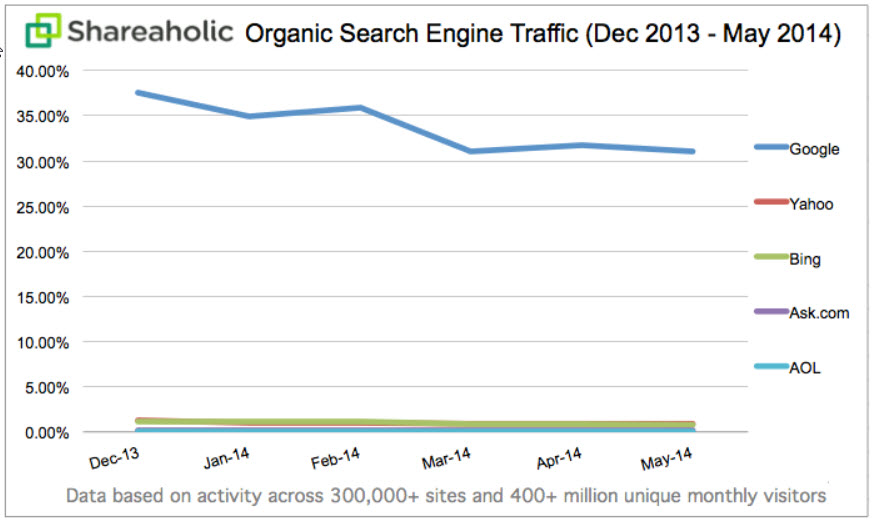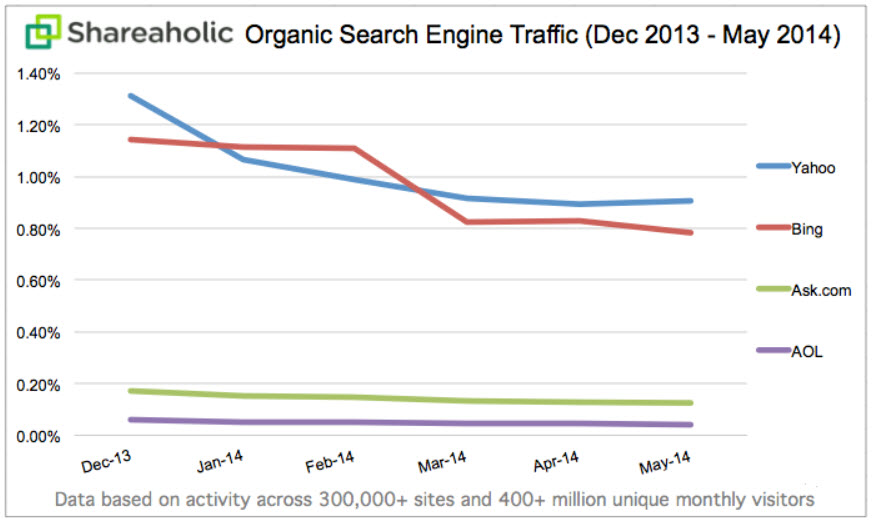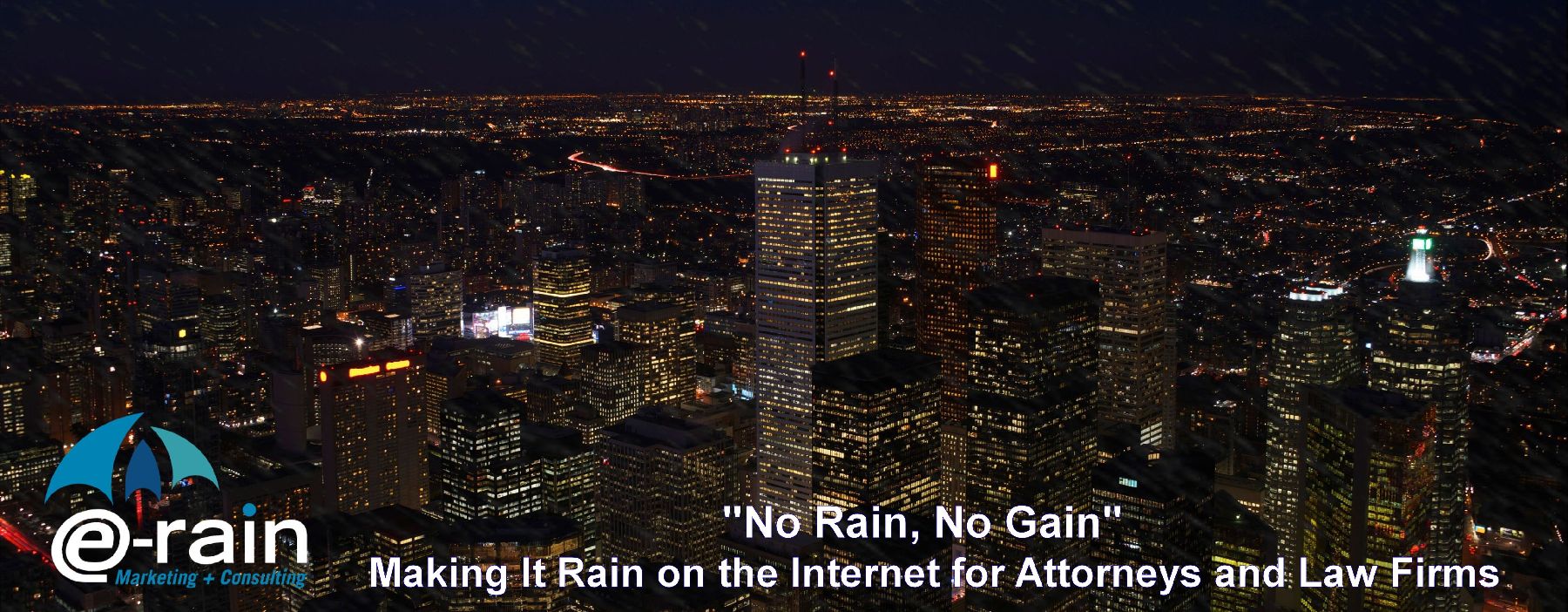In a fascinating report published this week by Sharaholic, visitor traffic to the major 5 search engines – Google, Yahoo!, Bing, Ask and AOL has dropped more than 30% since December of 2013. The report provides valuable insight for all of us, not only into the behaviors associated with the big 5, but in their market share and the quality of outcome for their own users.
 What is a visit from the search engines going to look like from the various search engines? Both Yahoo! and Bing exceeded Google’s numbers for “time spent on the site”, as well as “average pages per visit” and “average bounce rate.” ASK posted the highest aggregate marks from this perspective.
What is a visit from the search engines going to look like from the various search engines? Both Yahoo! and Bing exceeded Google’s numbers for “time spent on the site”, as well as “average pages per visit” and “average bounce rate.” ASK posted the highest aggregate marks from this perspective.
It is important to note that the metrics clearly show that visitors from ASK, Bing and Yahoo! may actually represent a more valuable visit and offer a higher opportunity for conversion.
One must also provide consideration to the demographics of each search engine. Ask and Bing tend to appeal to those who are 35 and up, and average incomes are a bit higher. Yahoo!’s sweet spot is a younger audience, while AOL users tend to be, as one analyst put it “a little more experienced and sophisticated” (read above 50).
Make no mistake about actual search volume – Google’s US market share across the board dwarfs its competitors. The most recent market shares for overall US traffic is 67.6% for Google, Bing is second with 16.7% and Yahoo! follows with 10.1% of US search queries.
Traffic to Search Engine Sites (Past 6 Months)
 When we consider the volume of organic traffic sent to websites across the internet by the search engines over the past 6 months, the story becomes even more interesting.
When we consider the volume of organic traffic sent to websites across the internet by the search engines over the past 6 months, the story becomes even more interesting.
Google continues to crush its competitors, and still continues to bring more than 30% of overall traffic to websites (Bing and Yahoo! are less than 1% each). Shareaholic’s report showed that Google sends more than 17 times the total number of visitors than Bing, Yahoo!, Ask and AOL combined!
This trend is important to consider, and we will be watching it carefully in the coming months. It is also important to keep in mind that the numbers reflected here are “organic”, meaning the source of traffic was an actual search engine result, not a paid advertisement or banner click.
But what about that “flat line” at the bottom of the graph (the non-Google competitors)?
 If we take Google out of the picture we are able to see a better view of what is going on with the rest of the pack.
If we take Google out of the picture we are able to see a better view of what is going on with the rest of the pack.
Note the back and forth battle between Yahoo! and Bing over the past 6 months. Yahoo! is enjoying a better result, but the two are virtually interchangeable as of late. Each has a separate audience, and that is a heavy factor as we review content strategies and placement within organic results in both.
This view gives you some perspective on the ranking of non-Google search engines: they are all below the 1% line – they each brought less than 1% of all organic visitors to websites world wide.
No, it isn’t time to declare the search engines dead, and hoist the social media flag. The decline has many social media types hyping the value of social media sites such as Facebook, LinkedIn, Twitter and Google+. We whole heartedly believe that social media should be an ingredient in your online strategy, but it’s fourth or fifth in priority – especially when you take into account what we consider to be the bottom line in “Making it Rain”: Paying Customers.
We recently completed an in-depth analysis of two separate clients with heavy social media presence in Facebook, LinkedIn, Twitter and Google+. The “referring domains” report showed Facebook as the 3rd highest referring source of traffic, and LinkedIn as the 5th highest source. Yet, when you dig deeper and look at the actual activity, visitors from the two social media giants tended to visit 1.17 pages during their visit to the site (the blog post or article referenced in the social media post), and over the past 6 months social media only accounted for 2% to 3% of the visitors who had submitted a contact form (or e-mail), or who had actually visited the “contact us” page of the client’s site.
The moment of conversion due to a social media influence was a small fraction of actual calls and emails from the sites.
What conclusions are we able to draw? Yes, organic search traffic has declined a bit over the past two business quarters. Google is still the Gorilla in the marketplace and the lion’s share of opportunity for most of our legal clients (is that enough animal references for a single sentence?). Segmentation within target markets based upon generational groups is widening, and this must be a factor in your strategy. Expanding the potential sources of referred visitors to your site reduces the impact of any single source (such as Google algorithm change). Organic search engine visits are still a substantial portion of any legal marketing strategy. If you do not have a well orchestrated organic strategy you are missing access to the largest marketplace for those who do not know you, are not aware of you, or are not thinking of you and your message when they sit down to do their research.
Have an organic strategy, and measure the results. Make it rain.
No Rain, No Gain.
